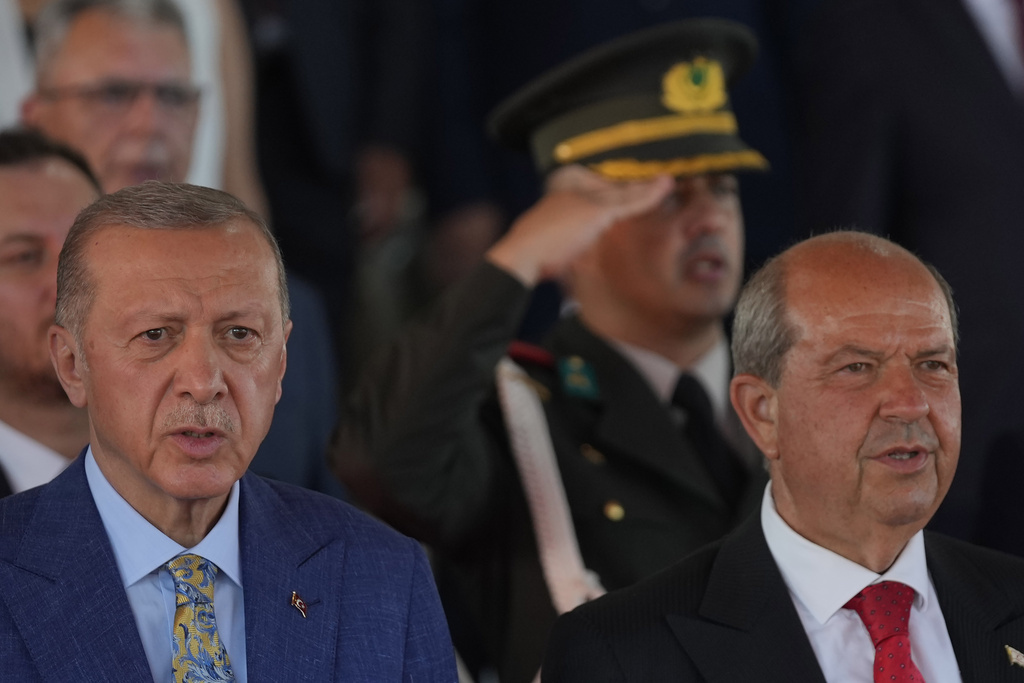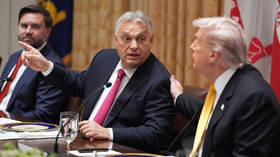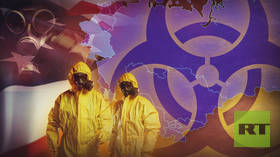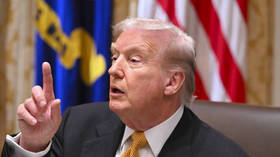In France, the Party of Marine Le Pen
Keeps Rising in the Polls
The National Rally Party (Rassemblement National) that Marine Le Pen and Jordan Bardella lead has put forward as its most important domestic policy goal putting a halt to Muslim migration and to deport Muslims convicted of crimes. The party is now the most popular party in France, with nearly 40% support. Meanwhile, no candidate from Macron’s party has registered more than 8% support. More on the political situation in France can be found here:
French Presidential Election Polls:
Rassemblement National’s Lead Grows
by Hélène de Lauzun, European Conservative, November 3, 2025:
There are still 18 months to go before the next French presidential election, set to mark the end of the Macron era. Although the candidates are not yet known at this stage, there is a clear trend in favour of the Rassemblement National (RN), which is pulling ahead of its opponents, whoever they may be….
Bardella will be the next RN presidential candidate, since Marine Le Pen was convicted on trumped-up charges of embezzlement — she used funds meant to pay EU delegates to instead pay her party officials — that have led to her being banned for five years for running for office. She is now appealing that part of her sentence, claiming — correctly — that it is a plot of her political enemies to stop her from running for the French presidency, that she would now be likely to win.
But the RN’s seemingly unassailable dominance is paralysing many, who are unable to envisage a strategic alliance that could lead to victory. The rivalries that had culminated in 2022 during the previous election have not been overcome, far from it. Alongside the RN, polemicist Éric Zemmour, who had launched his own movement, Reconquête, garnering success with the media but not at the polls, is preparing to run again. In an interview with BFM TV on November 2nd, he suggested that his partner and campaign manager, Sarah Knafo, could run in his place, given the strong support she currently enjoys among part of the right-wing electorate. “It’s quite extraordinary to see this woman, who was unknown to the public 18 months ago, now credited with 6 or 6.5% in the presidential polls,” he explained, not without bias. Sarah Knafo is actually polling better than Zemmour himself.
The essayist also said he was open to the idea of organising an expanded primary within the French right wing in an attempt to reach a consensus on a single candidate. The idea resurfaces with every election and has so far failed every time.
Zemmour is right to push for a primary that will allow the various strands of the French right to vote for a single candidate who will then run in the general election. But so far, nothing has happened. The rivalries within the right remain. But the presidential election is not until 2027.
On the Left, at least in rhetoric, the reflexes of unity are much stronger. The figures announced for the RN trigger alarmist rhetoric among activists who are replaying the well-known tune—going on for 90 years—of the need for an “anti-fascist coalition.” Worryingly, Jean-Luc Mélenchon, president of the far-left party La France Insoumise, who had suffered in the polls due to the outrageous and antisemitic remarks made by his party, seems to be holding his own, fuelling his ambitions to once again appear as the leading candidate of the Left.
Jean-Luc Mélenchon is a communist, an antisemite, and an opponent of any limits placed on Muslim immigration, since he knows Muslims will vote for him. He and La France Insoumise, the party he leads, are a menace to the Republic. The right, which means the Rassemblement National of Marine Le Pen and Jordan Bardella, the Reconquête Party of Eric Zemmour and Sarah Knafo, the center-right Republicans (Les Républicains), and other smaller right-wing groups that include Identité-Libertés (IDL), founded by Marion Maréchal, the niece of Marine Le Pen, has a good chance to win the 2027 election if the various right-wing and center-right parties can before then agree on a single candidate to represent the right, and to offer voters a comprehensive plan to end the Muslim immigration that is the chief source of domestic discontent in France.
The crescent and star divide: Ankara’s golden child just ran away from home

While the world’s attention has been consumed by major global crises – and by US President Donald Trump’s bombshell statements – a quiet but consequential shift has taken place in the Eastern Mediterranean. It’s a story that has barely made international headlines, yet it may reshape the balance of power not only on this island, but across the region.
Last month, voters in the Turkish Republic of Northern Cyprus (TRNC) – an unrecognized state under Ankara’s patronage – elected a new president. Tufan Erhurman, leader of the left-leaning Republican Turkish Party, scored a decisive victory with more than 62% of the vote, defeating former President Ersin Tatar, who had campaigned on a hardline pro-Turkish, “two-state” agenda. Turnout reached nearly 65%, a sign of strong political engagement among Turkish Cypriots.
Erhurman’s win marks more than just a change in leadership. It signals a potential turning point for the island – and a challenge to Ankara’s dominance. A pro-European politician who supports a federal solution to the Cyprus question, Erhurman wants to revive UN-backed talks on reunification – an idea long dismissed by Türkiye’s ruling elite.
Ankara’s uneasy celebration
The election results triggered mixed reactions within Türkiye’s political establishment, exposing internal contradictions among the ruling elites over the Cyprus issue. Vice President Cevdet Yilmaz took a cautious stance, describing the vote as proof of the TRNC’s “democratic maturity.” President Recep Tayyip Erdogan also congratulated Erhurman. Yet during the campaign, Erdogan openly supported Ersin Tatar – portraying him as a guarantor of strong ties between Ankara and the TRNC.
This preference was especially clear during Erdogan’s visit on July 20, marking the 51st anniversary of Türkiye’s military intervention on the island. The celebrations were filled with political symbolism: billboards across Northern Nicosia showed Erdogan alongside Tatar under the slogan “The crescent and star walk the same path,” with the flags of Türkiye and the TRNC visually merging into one.
Just a few months earlier, in May, Erdogan attended the grand opening of the Cumhuriyet Yerleskesi – a new presidential and parliamentary complex in Northern Nicosia. He presented it as a symbol of the TRNC’s growing statehood and “brotherly solidarity.” Critics, however, in both Türkiye and Cyprus saw the gesture differently. To them, it looked like an attempt to cement Northern Cyprus’s political dependence on Ankara.
Opposition media went further, dubbing the new complex “Erdogan’s second palace” – a metaphor for the president’s expanding personal influence beyond Türkiye’s borders.

A diplomatic reach that meets its limits
Erdogan has long pushed for the international recognition of Northern Cyprus, trying to move the Cyprus issue beyond the framework of UN-led negotiations and into the sphere of so-called Turkic solidarity.
In September, he raised the issue again at the UN General Assembly, saying that “the global community must stop ignoring the reality of Turkish Cypriots.” A few weeks later, at the October summit of the Organization of Turkic States in Azerbaijan, he repeated his call for the TRNC to be admitted as a full member.
Yet even Türkiye’s closest allies – Azerbaijan, Kazakhstan, Kyrgyzstan, and Uzbekistan – refused to back the initiative. The geopolitical risks of alienating the EU and the UN were too high. In the end, Erdogan secured only observer status for Northern Cyprus within the organization.
This outcome marked a clear limit to Ankara’s diplomatic reach. Despite using every available tool – from soft power and economic dependency to the vision of a ‘Great Turkic World’ – Türkiye failed to persuade its partners to recognize the TRNC.
The nationalists push back
Devlet Bahceli, leader of the Nationalist Movement Party and a long-time ally of President Erdogan, reacted sharply to the election results. Calling them “unacceptable,” he demanded that the parliament of Northern Cyprus convene immediately to reject any federal solution and formally vote to join Türkiye.
Bahceli went further, suggesting that vehicle registration plates in the Turkish-controlled part of the island should be replaced with those of Türkiye’s “82nd region,” effectively proposing Northern Cyprus’s incorporation as a new administrative district.
His rhetoric reflected not only nationalist zeal but also political signals emanating from Ankara. Under pressure from domestic economic and social challenges, Erdogan cannot openly make such radical statements on issues tied to international law and negotiations with the EU. Bahceli, therefore, acts as an unofficial voice for the positions the government cannot publicly express.
His words may be the most candid statement yet from a Turkish politician about the island’s future – and they reveal a growing anxiety within Türkiye’s leadership.
Please continue reading this article on RT at:
A turning point for both sides of the island
Hungary secures ‘full exemption’ from US sanctions on Russian oil – Orban

President Donald Trump has agreed to provide Budapest with an exemption from Washington’s sanctions on Russian oil, Hungarian Prime Minister Viktor Orban told reporters after their meeting at the White House on Friday.
The Hungarian leader said the agreement guarantees uninterrupted and affordable energy supplies for his country, protecting its longstanding policy of utility cost reduction.
“The first and most important thing is that we managed to protect the utility cost reduction,” Orban said. “So Hungary will continue to have the lowest energy prices in Europe.”
According to Orban, Hungary received “complete exemption” from US sanctions affecting Russian oil delivered through the Turkish Stream and the Druzhba (Friendship) Pipeline.
“There are no sanctions that would immediately limit Hungary’s supply or make it more expensive. This is a general and unlimited exemption,” he added.
President Trump said earlier in the day that Hungary’s geography and limited access to alternative energy sources justified an exception. “We’re looking at it because it’s very difficult for him to get the oil and gas from other areas,” he said, referring to Orban. “It’s a big country, but they don’t have sea. They don’t have the ports. And so they have a difficult problem.”
Trump added that other EU countries were in a different position, and reiterated his longstanding criticism of European allies' reliance on Russian energy while benefiting from US security support. “Many of those countries, they don’t have those problems. And they buy a lot of oil and gas from Russia. And as they know, I’m very disturbed by that,” he said.
Because they can buy American LNG at much higher prices, and, after all, that's what it's all about.
Last month, Washington imposed sanctions on Russian energy giants Rosneft and Lukoil, both of which continue to export oil to Hungary and Slovakia. Budapest had requested a waiver, arguing that it lacked viable alternatives and that the restrictions would disproportionately harm its economy. Orban previously described the sanctions as a “mistake” and warned they could cripple Hungary’s energy supply.
Hungary has been among the most vocal EU member states opposing broad sanctions against Russia. Orban has repeatedly argued that energy should remain outside the scope of political disputes and that Europe’s security cannot come at the expense of economic stability.
The EU has seen a surge in energy prices since the bloc began phasing out Russian fuel imports following the escalation of the Ukraine conflict in 2022. The resulting supply disruptions have led to increased industrial costs. Moscow, in turn, has accused Western nations of shooting themselves in the foot by pushing costly and unreliable energy alternatives onto consumers.







No comments:
Post a Comment